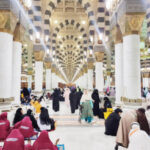To mark my 30th year in the practice of journalism, I bring to you today snippets of some of the most memorable interviews that I did or was involved in during my sojourns at Citizen magazine [1990-94], Sentinel [1994-94], New Nigerian [1995-2006] and also at Daily Trust, 2006-2019.
Don’t be deceived by the word “memorable;” one interview was actually very embarrassing. In April 1997, Sultanate Council Secretary Inuwa Abdulkadir phoned and said Sultan Muhammadu Maccido wanted to know when I would be in Sokoto to interview him on his first anniversary on the throne. I said I would come at the weekend. When I told my managing director Prof. Abubakar Rasheed, he said, “Kai Jega bakada hankali! If the Sultan wants to see you, drop everything and go! Proceed to Sokoto tomorrow! Apply for travelling allowance!”
- Osun Sterling Tourism Vision 30-30 Lays Foundation For Tourism Development In Nigeria
- Aviation Minister Acquires 3 New Aircraft For NCAT
The interview took place in the Sultan’s private office. Though there was a large desk, Sultan Maccido sat on a sofa and motioned me to sit on a nearby sofa. The interview lasted about an hour. When I finished, I played back the recorder; it had not recorded a word. I rushed to my car and tried again on the car stereo; no dice. I rushed back to the hotel and tried it on a big radio; again not a sound. With great trepidation I went back to the palace and told Inuwa what happened. When the Sultan was told, he laughed heartily and said, “Kasan karhen bature yadda shike. [You know how a white man’s tool is].” He granted me another interview the next day and I went in with three tape recorders.
Probably my most bombastic interview was with Dr. Umaru Dikko in April 1998, for the debut edition of New Nigerian Weekly. Even though he granted me an appointment in writing, stating date and time, Dikko stood at the door and blocked the entrance when I arrived at his house. “Yes? What do you want?” I said I came for my interview and he said, “Which interview? I don’t need any interview! Every newspaper and every radio station in this world have mentioned my name! [Referring to the crate episode of 1984]. It is you who is trying to use me in order to advance your fledgling journalism career!”
“Which newspaper are you from?” When I said New Nigerian, he said, “Do you even know why Sardauna established New Nigerian? Sardauna was sitting here; Charles Sharp [New Nigerian’s first British managing director] was sitting here; and I was sitting here. You, were you there?” I stood my ground and in the end we had a three-hour interview.
My interview with Military Governor of Katsina State Colonel John Yahaya Madaki in 1991 was unforgettable. As I sat in his waiting room, Madaki stormed in, chased away a contractor, then turned to me and said, “Who are you and what do you want here?” His press secretary Abubakar Sadiq Yar’adua’s quick intervention saved me. I was ushered into Madaki’s office and sat on a sofa. Madaki came and sat on the centre table, breathing into my face. He said, “Ok, what do you want to ask me?” I said, “Sir, please sit down on a chair.” He flared up. “This is my office! I will sit down wherever I want!” In the end we had a friendly 90 minutes interview. He told me stories about he narrowly escaped execution during the Dimka coup of 1976.
I subsequently got more practice in handling difficult powerful people. During the Interim National Government days in 1993, I went to interview SDP National Secretary Sule Lamido in Abuja. I sat in his office for an hour while he quarreled with some anti-June 12 SDP state chairmen who came to collect their share of the money that government just dished out to SDP and NRC. He then took me to a side office for the interview. The rump SDP-controlled Senate had just impeached its pro-June 12 president, Dr. Iorchia Ayu, but Lamido told me with a straight face that he did not know about it.
One of the most eloquent men I ever interviewed, at Abuja’s Nicon Noga Hilton, was Enugu NRC chieftain Reverend Hyde Onuaguluchi in March 1993. He was battling to stop his rival Joe Nwodo from winning the party’s presidential ticket. He said, “As a man of God, whatever God does, I support it. When God gave Nwodo’s brother the governorship of Enugu State, I supported it. When God made his sister a permanent secretary in the state, I supported it. When the only federal appointment given to Enugu State was given to a member of the same family, I supported it. If God gives Joe Nwodo NRC’s presidential ticket, I will support it. Maybe God wants us to lose the election, we don’t know.”
In 2000AD I went to Sokoto to interview Hajia Amina, Goggon Kano, wife of the Sardauna Sir Ahmadu Bello. My effort to book an appointment through intermediaries failed, so I just walked up to the house and sent a small girl to tell Goggo she had a visitor. When I was ushered in, I said, “Goggo, I am from New Nigerian, the newspaper that Sardauna established.” She nodded, and the interview began. Goggo’s answers were very brief. I feared that the interview would end in a few minutes, so I manufactured follow-up questions like never before in my career. “What was Sardauna’s favourite food?” She said, “Tuwo and kuka soup.” “Did he like meat?” “Yes, very much.” “Did he drink fura?” “Yes, he liked fura.” “Did he put sugar in his fura?” “No, Sokoto people don’t put sugar in fura.” “Did he drink Coca Cola?” “No, but he liked Tree Top.”
Up close, you sometimes get to see that powerful people are also human. In 1993 I was in Minna to interview Niger State Governor Musa Inuwa for Citizen magazine. He gave me a 9am appointment but at that hour he had some VIP visitors. When we finally sat down with him at 11am, he said, “It is because you are in a hurry to return to Kaduna. I am very hungry. I have not had my breakfast.” I quickly stood up and said, “Please have your breakfast. I am not in a hurry.”
In September 1992, my bosses at Citizen took me to Abuja to interview General Shehu Yar’adua, who just won the SDP presidential primaries. We were taken to the dining table and Yar’adua, who sat on a sofa nearby, picked up his box of Benson & Hedges cigarettes and joined us. Throughout the two hours interview he always had a lighted cigarette in his fingers, though a whole stick sometimes burnt out without his smoking it.
Just before the June 1992 National Assembly elections, I went to interview Governor Yahaya Abdulkarim in Sokoto. He was engaged in a struggle to stop Senator Garba Ila Gada from clinching an NRC senatorial ticket. I asked him why. He kept parrying the question and when I insisted, he pointed at my tape recorder and said, “Turn it off.” He then said, “You know why we are quarreling? He wants this [governor’s] seat. That is why.”
I had a puzzling experience in 2001 when I went to Lokoja to interview Governor Abubakar Audu. He insisted that I be taken round the state to see his major projects before the interview. They were quite impressive. Just before I was ushered into his office, his press secretary pleaded with me, “Please, when we go in, praise my Oga. He likes praise. Help me and praise him!”
In April 1996 I got to interview former Israeli Prime Minister Yitzhak Shamir in his Tel Aviv office. I asked him if it was true that he engaged in the 1992 Middle East peace talks in Madrid under US pressure and had no intention of reaching a deal. I was fully expecting him to deny it and had planned my follow up questions. Shamir, who was 80 and hard on hearing, nodded vigorously and said, “Yes, it is true.” I was stuck. I was used to Nigerian politicians denying what is true.

 Join Daily Trust WhatsApp Community For Quick Access To News and Happenings Around You.
Join Daily Trust WhatsApp Community For Quick Access To News and Happenings Around You.


